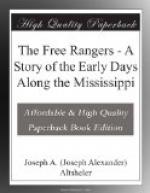Alvarez saw his sentinels at either side of the camp, to right and left, walking back and forth, and he knew also that they would watch well. Time passed. The night darkened and then a wan moon came out, casting a ghostly, gray shadow over the measureless black forest. The great stars, pale and cold, danced in a dusky blue. Faint moans came out of the depths of the wilderness, as a stray wind wandered here and there among the leaves. Francisco Alvarez, resolute and self contained though he was, could not sleep. He had taken a bold step in holding the messenger of peace, and, although one might do much a thousand wilderness miles from the seat of his authority, he was nevertheless anxious to have the full support of Bernardo Galvez, the Spanish governor of Louisiana.
Royalist to the marrow, he wished the colonists to be defeated by their mother country, and he wished, moreover, that Spain might make secure a title to all the immense regions in the valley. If he could skillfully commit Spain to a quarrel with the settlers much might be done for the cause in which his heart was enlisted. He foresaw the truth of Paul’s warning that in a little while nothing could uproot the settlers in Kentucky. A blow at them, if it would destroy, must fall quickly, and he meant that the blow should be given.
His anxiety weighed heavily upon him and the wilderness at night grew more uncanny. Sleep refused to come. The coals sank lower. One by one they gleamed with the last fitful sparks of dying fire and then went out. The two sentinels, one to the right and one to the left, had sat down now upon fallen logs, but Alvarez knew that they were still watching with care—they would not dare to do otherwise. All the rest but Alvarez slept.
The Spaniard looked at Braxton Wyatt as he lay in his blanket, one arm under his head, and his lip curled. He despised him, and yet he could be very useful. He would have to work with him and he must treat him at least with superficial politeness. Then he looked at the prisoner. Paul, too, slept soundly, his fine face thrown into relief in the wan moonlight, every sensitive feature revealed. Alvarez wondered again that he should find a youth of such classic countenance and cultivated mind in the deep forest.
The wandering breeze ceased, and the wilderness fell into a silence so deep and heavy that it preyed upon the nerves of the Spaniard. Then, out of the stillness came a long, plaintive note, wailing, but musical, full of a quality that made it seem to Alvarez weird and ominous.
“Only the howl of a wolf,” muttered the Spaniard, who recognized the long-drawn cry. But it made him shiver a little, nevertheless. He alone was awake, except the sentinels, and he felt like a tiny, lost speck in all the vast wilderness. A second time came the cry of the wolf, and then it was repeated a third and a fourth time. After the fourth it ceased.
The four cries were so distinct, so equal in length, and repeated at such regular intervals that they seemed to Francisco Alvarez like set notes. He listened intently, but they did not come again. He glanced at the prisoner but Paul had not stirred, the moon’s rays illuminating his face with a pale light. The renegade, too, slept soundly.




